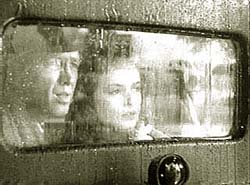Over the next three or four weeks, I am plying my trade and teaching a course of news skills to Louisianans. It's a double-shift kind of job - seven hours teaching, four hours preparation, three hours pure sleepless anxiety in the early days of the course. But all work makes Jack cranky. You never know what I'll be able to see and comment on during a winkless night. Mark your calendars for Halloween.
And in the meantime, don't miss The Woodsman: simple, unrelenting, unflinching, and a complete success.
Tuesday, September 27
Friday, September 16
Central Station
Walter Salles seems to have learned everything important about how to make road movies (Motorcycle Diaries) from the shortcomings of this film. But you have to give him credit for going Brazil instead of Hollywood, where the rule is "when in doubt, more sexy fun. Or at least be sure it's fast." The slow pace of Central Station shows how much director Walter Salles and editors Filipe Lacerda and Isabelle Ratherty trusted the story they'd shot.
They're over-confident. This is such a worthy story with too much slack in the middle. The second act - all of it on the road - shows little of Dora's (Fernanda Montenegro) real motivation. In fact, the conflict between her actions and words defuse her character's strengths. She is a clever, conscience-free pensioner eking out a living writing letters for illiterates at a dollar apiece. She doesn't mail them. In other words, no one cares. After reluctantly taking a stray boy whose mother is run down by a bus, Dora tries to return Josue (Marilia Pera) to his useless father. But she believes that children should never return to bad fathers. She is one of those children. Dora tries to impose the lessons of her past on Josue, first by not sending the letter Dora penned for his mother - cruel but trivial - and selling him for adoption - callous and self-interested. She finds a little humanity through a friend's conscience. Dora rescues the boy when she's convinced that the brokers sell the kids for organ donation. But she keeps the payment.
When Dora flees with Josue, she never becomes desperate. She lies and steals, gets drunk, goes broke. She sweats, but then everyone sweats on a Brazilian bus. In the many prolonged scenes, the filmmakers try to show us who Dora and Josue really are against the blue and golden back country of Brazil (not what I saw on my visit). To sustain the duration, I wanted to see inner motivation revealed (okay, she talks about it, but that's not film, that's theater) or their desperation heightening. The second act flags as Dora's original motivation goes soft (to get rid of the boy), and no new motivation clearly emerges.
In the third act, Dora learns that Josue's father intended to find the boy's mother in Rio. And in a moment, she turns from her lifelong anger and prejudice against her father. Did he really love her, but simply couldn't find a way to tell her? Dora leaves the boy with his two grown brothers, allowing him to hope that the man will return.
Central Station is a good example of a bad idea: saving the drama of the main characters' inner conflict until the third act. It shows us her epiphany, but not the change. She was ruthless and venal, and now she's broke and admits that her heart has always been broken. A genuine insight about being alive, but not a change, not an arc.
They're over-confident. This is such a worthy story with too much slack in the middle. The second act - all of it on the road - shows little of Dora's (Fernanda Montenegro) real motivation. In fact, the conflict between her actions and words defuse her character's strengths. She is a clever, conscience-free pensioner eking out a living writing letters for illiterates at a dollar apiece. She doesn't mail them. In other words, no one cares. After reluctantly taking a stray boy whose mother is run down by a bus, Dora tries to return Josue (Marilia Pera) to his useless father. But she believes that children should never return to bad fathers. She is one of those children. Dora tries to impose the lessons of her past on Josue, first by not sending the letter Dora penned for his mother - cruel but trivial - and selling him for adoption - callous and self-interested. She finds a little humanity through a friend's conscience. Dora rescues the boy when she's convinced that the brokers sell the kids for organ donation. But she keeps the payment.
When Dora flees with Josue, she never becomes desperate. She lies and steals, gets drunk, goes broke. She sweats, but then everyone sweats on a Brazilian bus. In the many prolonged scenes, the filmmakers try to show us who Dora and Josue really are against the blue and golden back country of Brazil (not what I saw on my visit). To sustain the duration, I wanted to see inner motivation revealed (okay, she talks about it, but that's not film, that's theater) or their desperation heightening. The second act flags as Dora's original motivation goes soft (to get rid of the boy), and no new motivation clearly emerges.
In the third act, Dora learns that Josue's father intended to find the boy's mother in Rio. And in a moment, she turns from her lifelong anger and prejudice against her father. Did he really love her, but simply couldn't find a way to tell her? Dora leaves the boy with his two grown brothers, allowing him to hope that the man will return.
Central Station is a good example of a bad idea: saving the drama of the main characters' inner conflict until the third act. It shows us her epiphany, but not the change. She was ruthless and venal, and now she's broke and admits that her heart has always been broken. A genuine insight about being alive, but not a change, not an arc.
Hiatus/Return
An unexpected visit home interrupted posting here. Baton Rouge without power is no place to be for long.
A note about liking movies but getting all up in their Koolade anyway: I like many movies I see. When I noodle about what makes them less than riveting, appealing, or piercing, I end up saying what's wrong. And I feel guilty. I don't enjoy doing it. Mind you, I'm only talking about the story is see. I liked stuff in the Spielberg mess The Terminal. I liked Central Station: a beautiful movie with a story full of often unrealized potential. And I really enjoyed Junebug, but I didn't think it hung together very well.
I'm not offering these observations lightly. Even industry executives said in a recent NY Times (story link is archived at the Times, but you can find it here) story that box office was down because "the product is not quality." Or "We make crap." Sure you do. Because it's hard to make interesting movies that must make money and appeal to a wide audience. Laundry detergent. That's what makes money and appeals to a wide audience. Still, I feel guilty.
So, I'm going to go on sounding like I think there's something wrong with everything I see. Darkness Visible didn't review The Terminal, right? Cause it's not worth the time. But here's why it's interesting: put your protagonist in a building he can't get out of. Even a big building. Create some drama. I dare you. Sure, watch Jeff Nathanson and Steven Spielberg fail. You and me, we'd fail, too.
A note about liking movies but getting all up in their Koolade anyway: I like many movies I see. When I noodle about what makes them less than riveting, appealing, or piercing, I end up saying what's wrong. And I feel guilty. I don't enjoy doing it. Mind you, I'm only talking about the story is see. I liked stuff in the Spielberg mess The Terminal. I liked Central Station: a beautiful movie with a story full of often unrealized potential. And I really enjoyed Junebug, but I didn't think it hung together very well.
I'm not offering these observations lightly. Even industry executives said in a recent NY Times (story link is archived at the Times, but you can find it here) story that box office was down because "the product is not quality." Or "We make crap." Sure you do. Because it's hard to make interesting movies that must make money and appeal to a wide audience. Laundry detergent. That's what makes money and appeals to a wide audience. Still, I feel guilty.
So, I'm going to go on sounding like I think there's something wrong with everything I see. Darkness Visible didn't review The Terminal, right? Cause it's not worth the time. But here's why it's interesting: put your protagonist in a building he can't get out of. Even a big building. Create some drama. I dare you. Sure, watch Jeff Nathanson and Steven Spielberg fail. You and me, we'd fail, too.
Subscribe to:
Posts (Atom)


